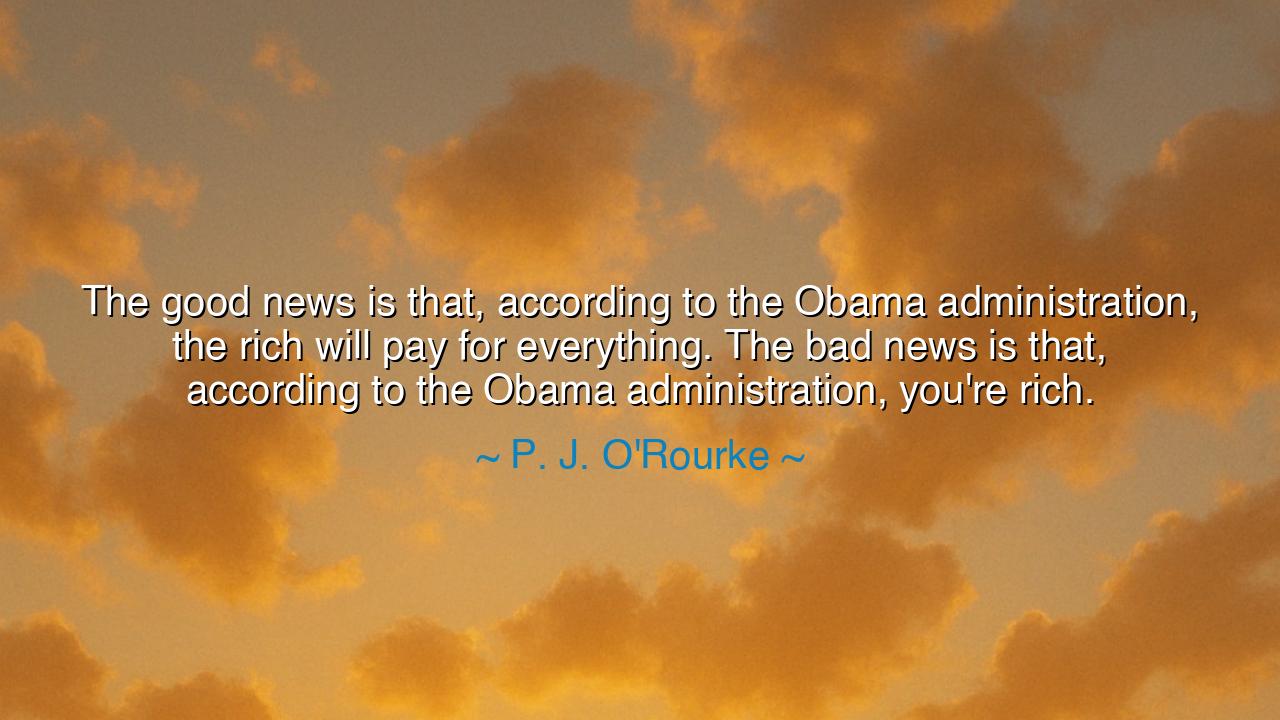
The good news is that, according to the Obama administration
The good news is that, according to the Obama administration, the rich will pay for everything. The bad news is that, according to the Obama administration, you're rich.






P. J. O’Rourke, the satirist whose tongue was sharper than many a sword, once quipped: “The good news is that, according to the Obama administration, the rich will pay for everything. The bad news is that, according to the Obama administration, you’re rich.” Though clothed in humor, these words unveil the eternal tension between government promises and personal burden. The rich, forever imagined as someone else, are revealed by O’Rourke to be none other than the ordinary citizen who suddenly finds the taxman’s gaze fixed upon him.
The origin of this jest lies in the debates of the Obama years, when reforms—particularly in health care—were declared to be funded by higher taxes on the wealthy. Yet O’Rourke, ever the skeptic of political speech, turned the claim on its head. To him, government’s definition of wealth often stretched downward, ensnaring not only the gilded elite but also the hardworking middle class. Thus, what was proclaimed as relief for the many became, in his satirical telling, a burden borne by those who never thought themselves rich at all.
History itself provides an echo. In the days of the French monarchy, kings assured their people that taxes fell only upon the nobility and the clergy shouldered the burden of spiritual care. But in truth, the peasantry bore the heaviest weight, crushed beneath levies that funded palaces and wars. They too might have laughed bitterly at O’Rourke’s words: the “rich” were always someone else, until suddenly the crown declared, “you are rich enough to pay.” And from that contradiction was born the fury of revolution.
So too in America’s own story, the income tax introduced in the early 20th century was promised as a levy only upon the wealthiest. But as decades passed, thresholds shifted, and millions who once thought themselves ordinary found themselves within the grasp of “the rich.” O’Rourke’s satire distills this reality: that definitions of wealth are elastic, and governments, in their hunger, stretch them ever farther.
Therefore, O seekers of truth, hear the lesson. Satire reveals what speeches conceal: that every promise of free provision must be paid for by someone, and oftentimes, that someone is you. The rich will pay for everything—but beware when rulers declare you to be rich. In laughter lies wisdom, for O’Rourke reminds us that vigilance, not trust, is the safeguard of liberty.






BBeluga
P.J. O'Rourke’s quote is both witty and thought-provoking. It reflects the paradox that often accompanies taxation policies aimed at wealth redistribution. The idea that everyone might eventually feel 'rich' enough to be taxed heavily seems like a practical issue with the way the system works. Should the focus be on creating a fairer system where the truly wealthy are taxed accordingly, or is there a better way to ensure no one feels unfairly burdened?
H7Thanh Hung 7/9
This quote speaks to a common frustration about how tax policies often end up affecting more people than they’re intended to. If the definition of 'rich' is too broad, aren’t we just shifting the burden unfairly onto the middle class? Could a more targeted approach to taxation help ease the pressure on those who aren't necessarily wealthy but still find themselves paying more than they can afford?
PLNg Phuong Linh
O'Rourke’s humor cuts through the complexity of the issue. The idea that most people find themselves unexpectedly categorized as 'rich' makes me wonder: How do we balance the need for higher taxes on the wealthiest with the burden it places on the middle class? Could a more progressive tax system that better defines who is 'rich' offer a solution, or will it always seem like the middle class is stuck with the tab?
GDGold D.dragon
This quote is a bit satirical, but it reflects a real concern people have about taxation and wealth distribution. If the wealthy are supposed to foot the bill, but most of us end up paying more, does that mean the system is flawed? How do we draw a line between 'wealthy' and 'average' in a way that’s fair to everyone? Is the Obama administration's approach truly addressing wealth inequality, or is it exacerbating the problem?
HHVo Huy Hoang
O'Rourke’s quote highlights a common critique of tax policies that target the wealthy, but it also brings up an interesting point about the definition of 'wealth.' If the threshold for being considered 'rich' is set so low, what does that say about the economic divide in America? Could it be that the perception of wealth is skewed, and we’re all bearing the burden of these policies, even those who might not feel particularly wealthy?